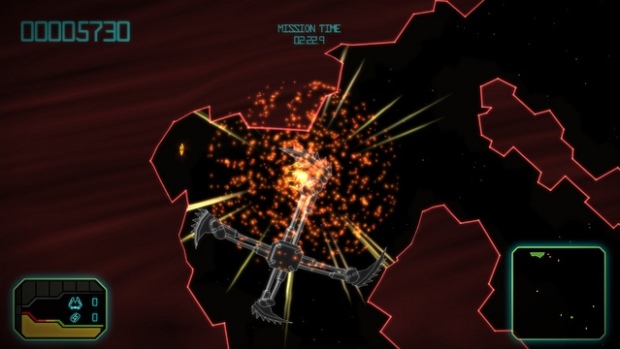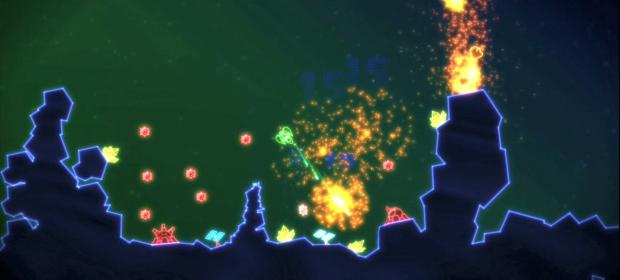As multi-directional shooters go, Gravity Crash Ultra nails the basics. The left stick controls movement, the right your bullets while the right bumper fires your chosen special weapon. It may sound a bit bare bones, but it’s exactly what this type of game should be; easy to pick up and play, difficult to master. And you will have to master it. Gameplay sees you fighting across a 2D level, collecting or killing whatever the mission specifies, all the while struggling against gravity at the cost of fuel.
Enemies shoot at you as you race through spaces barely wide enough to take your ship, always on the lookout for fuel crystals or powerups to help you on your way. Plotting a route through the level becomes a series of quick course corrections, letting your momentum take you where you want to go rather than freely zipping all over the screen. It’s a delicate balance, but it means the short-burst levels feel engaging for the entire time – you don’t get a moment to rest.

The timer at the top of the screen emphasises this, the opening to each level giving you a recommended time to complete it in. It’s a neat way of adding that extra depth for hardcore players, but in the campaign it’s largely pointless. Made up of 30 levels in six solar systems, the campaign doesn’t really have an overarching story. Who you’re fighting and why isn’t explained, you just have to complete the objectives at the start of every mission, every kill adding to your overall score. Add in the beautiful neon wire-frame visuals on a black background and shots that genuinely go “pew pew” and you can tell that Just Add Water set out to make a game inspired by 1980’s arcade shooters.
Those 1980’s arcade shooters were hard. Not to be a cynic, but they wanted more of our money, they wanted you to pay for one more life. Gravity Crash Ultra is the antithesis of this. You’ve paid for the game, they can’t charge you more, so death becomes utterly meaningless. Yes, you lose your overall score after your lives are up, but you continue from the same point. The score itself goes onto a campaign mode leader board for all the world to see, but you’ll have to really care what random strangers on the internet think for that to be a selling point. In turn this scuppers the streamlined campaign mode – you certainly aren’t playing it for the story. Gravity Crash Ultra finds itself in an awkward halfway house between the past and the present.
The same can be said of the control scheme. While using the left stick to move and the right to shoot is a staple of the genre (and it does include a classic mode where one rotates and you can only shoot in the direction you’re facing), the default setting is a new Anti-Grav mode, added for the Vita release. If you can’t guess, this negates gravity’s effect on your ship – in other words turning off one of the main aspects of the entire game. And this is the default! I didn’t realise until I was halfway through the game, when I was looking at some old words on the original and wondered why they spoke about gravity being so integral. It’s not as if I didn’t check out the other control options when they were offered to me, but it had the same description as the Dual Controls, and I figured with it being the first highlighted option that it would be the way the developers wanted you to play it.

It might be forgivable if every level didn’t just devolve into killing almost everything on screen until you trigger the end. Yes, you do have to take fuel into consideration, but the crystals you blow up to get more regenerate quickly enough, and you’ll spend time scouring later levels working out how to unlock a door or reach a certain area far beyond the point where doing so was fun – including one where I had to blow up a wall to proceed, despite the game never telling me how to do this, how to differentiate one wall from the others or that it was even possible.
VERDICT: The original Gravity Crash didn’t do too well when it came out in 2009, not least because it launched so close to PixelJunk Shooter. Now, five years on, this re-release doesn’t improve anything that was broken, and arguably detracts further from the titles it wants to emulate by setting the default option so easy. If you’re desperate for a multi-directional shooter for your Vita, and have played Q-Games’ masterpiece, then you might want to check this out. Otherwise, you should know where to spend your money.

AVERAGE. The epitome of a 50/50 game, this title will be unspectacular but inoffensive, charmless but amiable. We aren’t condemning a game by scoring it a 5, but we certainly aren’t championing it, either.
Review code provided by publisher.





